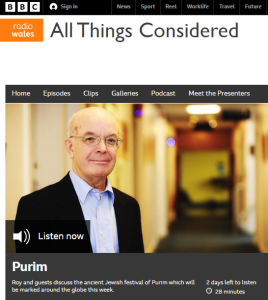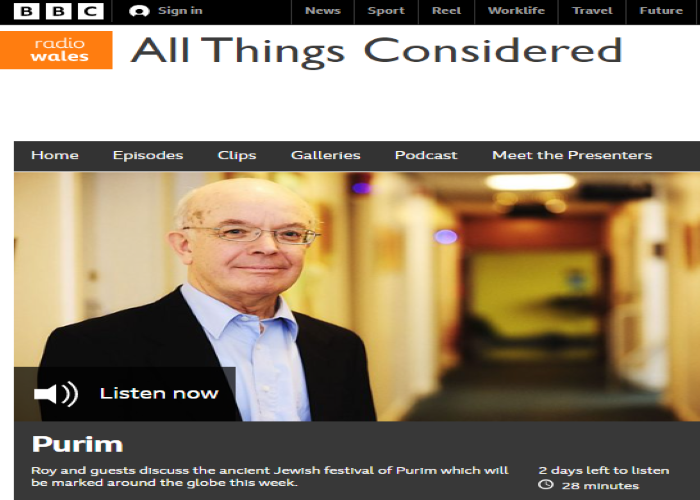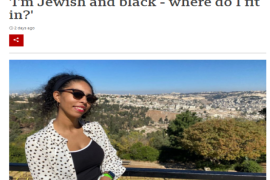Readers may recall that last month CAMERA UK wrote to BBC Radio Wales to request clarifications relating to an edition of the programme ‘All Things Considered’ on the topic of Purim.
WHEN BBC RADIO WALES SHOEHORNED PALESTINIANS INTO PURIM
We asked BBC Radio Wales to explain the use of the phrase “their less pleasant roots” in relation to Israeli Jews:
“What are those “roots”? In what way are they “less pleasant”? In what way have Israeli Jews supposedly “gone back” to them?”
We also asked why the topic of Palestinians was gratuitously yet superficially inserted into a programme ostensibly explaining a Jewish festival to listeners.
On April 28th we received a response (via an email account to which it is not possible to reply) from the programme’s producer that does not address those questions but does provide some insight into the BBC’s idea of “due impartiality”. [emphasis added]
“Thank you for your email of 11th April about the March 13th edition of All Things Considered, which I produced.
I am sorry you were unhappy with the wording of one aspect of the programme. I think it would be helpful for me to set out the premise of the programme and what we hoped it would achieve. All Things Considered has a strong reputation, built over several decades, for looking at all kinds of religious issues in depth. It is also billed as a religious affairs programme which is “tackling the thornier issues of the day in a thought-provoking manner”, and is intended for a main-stream, non-specialist audience, but one that is thoughtful and willing to be challenged and engaged. In this programme, we wanted to include information about the history of the festival of Purim, explore what it meant for Jewish people living in Wales and also consider the festival in the context of some contemporary discussion.
The programme’s main focus was on the exploration of Purim as a joyous Jewish festival, celebrated across Wales by religious and secular Jewish communities alike, and we heard from a number of contributors on this point. In my view, the programme gave an up-beat and joyful sense of contemporary Judaism in Wales and our contributors discussed a range of their own personal experiences, including how they had faced up to and responded to anti-Semitism.
We were interested in considering the festival in the light of some contemporary issues – our examination of religious matters always seeks to be relevant for a contemporary, and often secular, audience – and these included a reflection of the current attack on Ukraine and the concept of an existential threat to a group of people, a consideration of the ideas of deliverance and vengeance, and also reflections on the emergence of the State of Israel.
Reflection on this final point was in fact initially raised in the programme by one of our contributors, the academic and Rabbi, Dan Cohn-Sherbok, Professor Emeritus of Judaism at the University of Wales, who said: “…we have always been threatened by extinction, and yet here we are, we have survived, it runs in our blood. And if you ask about the contemporary significance, it underlines the creation of the state of Israel. The State of Israel is a response to antisemitism. Jews who were Zionists at the end of the C19th feared that without a country of our own we would never survive, and that the solution to the problem of anti-Semitism was to have a country where we could be secure, and we could defend ourselves. And no matter how secure we feel in other countries, and this is true everywhere, we are conscious of this potential threat. People hate us – it is the longest hatred of humanity, hating the Jews, and it runs in our blood – we are frightened and we need to defend ourselves and this story crystalises the idea that we can survive, and that God is on our side, and that we will survive into the future.”
The question you are unhappy about was asked in response to this and was phrased – as is commonplace journalistically – as one that puts the perspective of those groups who might challenge the views of the speaker. The presenter said: “Some people of course would look at the present state of Israel and say ‘well actually, they’ve gone back to some of their less pleasant roots, and they certainly aren’t treating people in the way they should’…” This is a common journalistic device and would be understood by audiences to indicate that the presenter is not giving their views, or indicating that the BBC has a position on the matter, but is posing the thoughts of some critics who might contradict Professor Cohn-Sherbok’s position. This, in my view, was necessary to ensure due impartiality on what is, by any editorial measure, a controversial issue and something that is required of us as a broadcaster.
In response, Professor Cohn-Sherbok stated his own recognition that there is such criticism of Israel, that in his view Palestinians have suffered and that in his view many Jews are sympathetic to the suffering of Palestinians – and indeed that he has written books on the subject himself. He reflects further that in his view the creation of the state of Israel was problematic because of its location, that he believes a two-state solution is the best one, and effectively he expresses his sorrow that there is hatred and enmity on both sides of the debate, leaving it an unresolved situation.
In my view, it was illuminating to hear Professor Cohn-Sherbok’s response on these points, which though inevitably extremely brief and not themselves the main focus of the programme, help our audience to further understand the highly complex issues he alluded to in his previous statement. I hope you will be reassured to know that he considered the question itself to be fair and appropriate.
I hope you find this explanation reassuring and thank you for your interest in the programme.
Yours sincerely
Dominic Jewel
BBC Radio Wales”
In other words, while the BBC considered it “necessary to ensure due impartiality” by “representing the thoughts of some critics” on a “controversial issue” which it chose to insert into the programme despite its lack of relevance to the declared subject matter, it still refuses to explain what that reference to the “less pleasant roots” of Jews was supposed to mean.
We do however learn that this BBC representative apparently believes that the existence of the State of Israel as “a response to antisemitism” is a “controversial issue”.






About 30 years ago I was listening to BBC program about religion. Talking about comparative religions has always been interesting to me until…
This really sophisticated program suddenly found something humorous in the news, in their judgment, it was a newsworthy story.
It was about a Jewish couple in Israel and the husband sued for divorce because he felt his wife’s nose was too large. They rattled on for about three or four minutes on the question of large Jewish noses.
This was their view of humor and comparative religions.
The Reform Rabbi whose opinions were sought in the programme was entirely incorrect, and does not at all “help our audience to further understand” this complex situation; in fact, it further muddies the waters by denying the rooted connection of the Jewish People to the land of Israel.
There has been a continuous Jewish presence for at least three thousand years until today, in what was biblical Israel, then latterly Roman-named Palestine, and through history since. The creation of the state of Israel has nothing to do with anti-semitism – it’s been the Jewish homeland for a very long time – and to suggest that its location is “problematic” is to deny the deep historical connection of the Jewish people to Jerusalem and to the land of Israel. It’s that view that is controversial, and the presenter just glossed over it and let it slide, and the response of the producer to your complaint was entirely inadequate although predictable.
As usual, the response of the BBC to this complaint just goes to demonstrate how little the corporation understands – or maybe cares about – the real situation in the area. He might as well claim that the establishment of the state of Ireland in 1937 was a response to the Great Potato Famine, although I suspect that, if a presenter made that comment, he or she would get a lot more blowback than they have on this occasion.